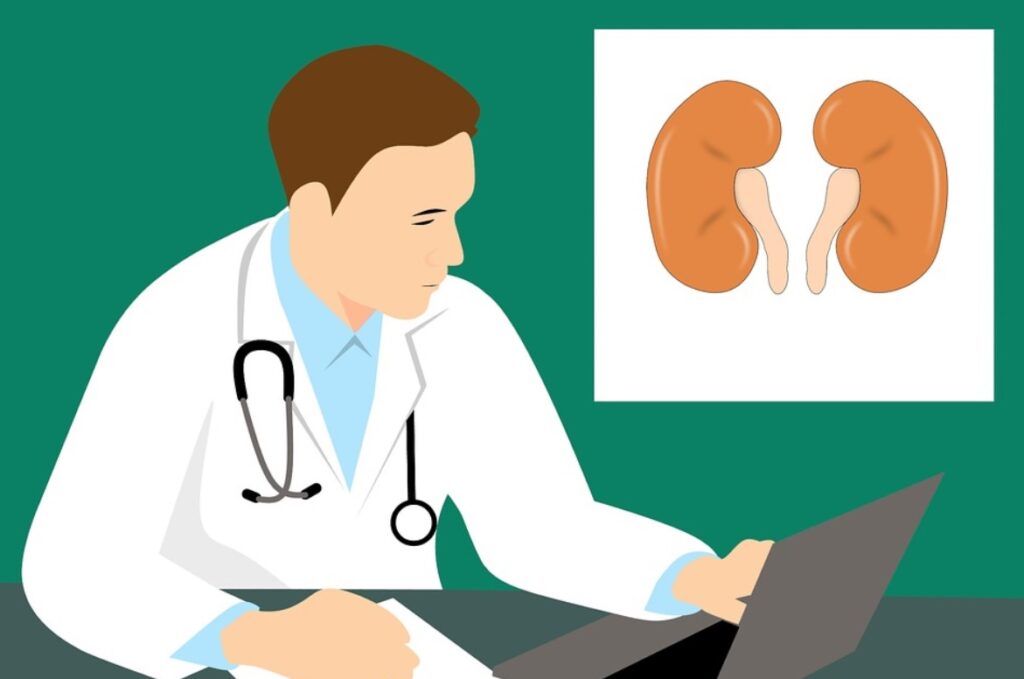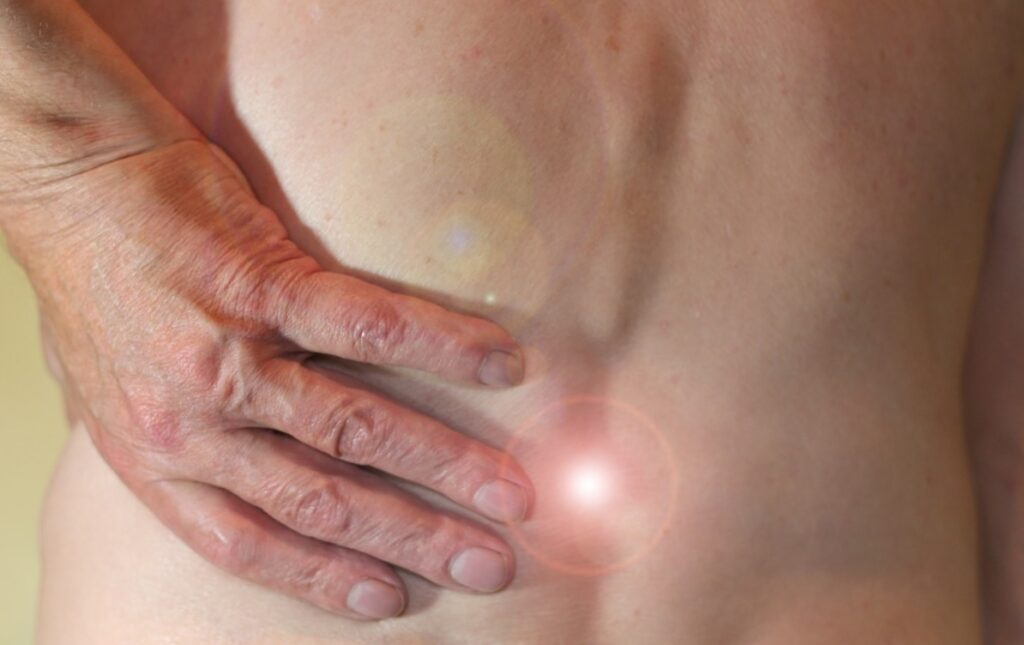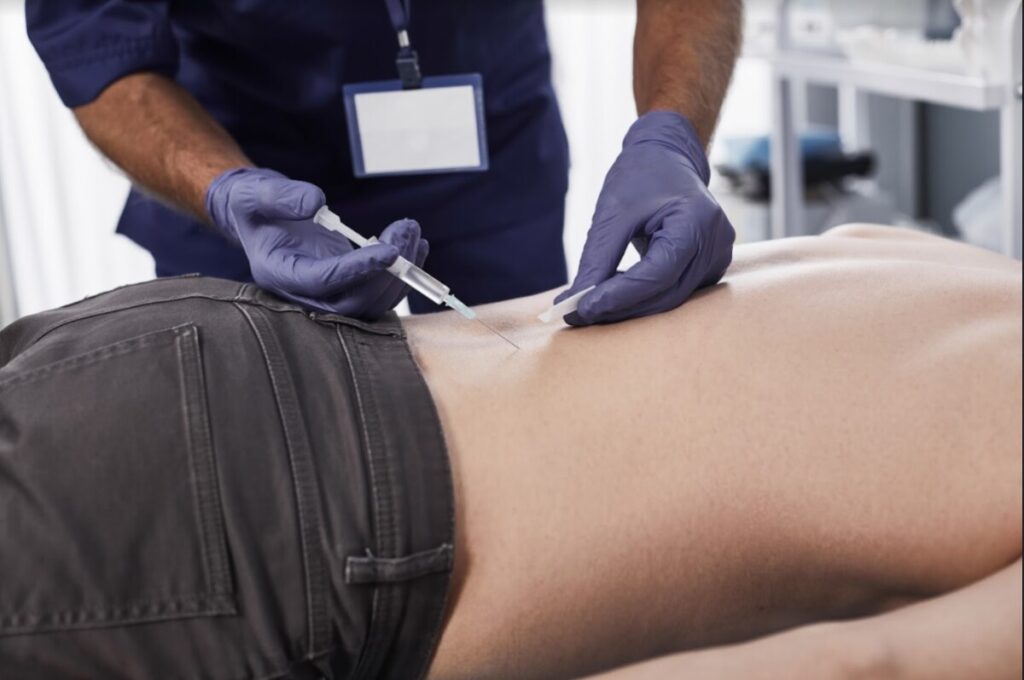Kidney pain, also known as renal pain, results from a kidney injury, malfunction, or infection. A kidney is a pair of bean-shaped organs situated on either side of the spine, which filter blood and balance fluid and electrolytes in the body.

Depending on the underlying reason, the pain might be minor and throbbing or strong and piercing. Although kidney pain is frequently mistaken as back pain, the sensation starts far deeper and is located higher on the upper back, just below the ribs.
If just one kidney is affected, the pain is unilateral; if both kidneys are affected, the pain is referred to as bilateral. This may indicate whether the problem is intrinsic (inside the kidneys), prerenal (above the kidneys), or postrenal (above the kidneys) (related to obstruction or disorder below the kidneys).
Causes of Kidney Pain
Kidney pain can be caused by various factors, including infection, trauma, obstruction, or growth.
1- Kidney Infection
A kidney infection, commonly known as pyelonephritis, is caused by bacteria and can damage one or both kidneys. Acute pyelonephritis is characterized by quick and severe onset, whereas milder, recurring episodes characterize chronic pyelonephritis.
Infection typically causes pyelonephritis to the ureters, bladder, or urethra from the lower urinary system.
Acute pyelonephritis often develops over two days. Among the symptoms are:
- Unilateral or bilateral kidney discomfort, frequently sharp and strong, felt in the flank (back and side), abdomen, or groin.
- Fever (greater than 102 degrees F)
- Vomiting and nausea
- Urination that is painful or scorching (dysuria)
- Urine that is cloudy or smells fishy
- Urine with blood (hematuria)
- Urge to urinate frequently(urinary urgency)
Chronic pyelonephritis is less severe, and there may be no symptoms in some instances. If symptoms do arise, they may include a dull discomfort in the flank, lethargy, and a low-grade fever.
2- Kidney Trauma
A blunt-force impact or a penetrating wound that lacerates one or both kidneys causes renal trauma. Injuries like these are prevalent due to the kidneys’ susceptible position in the belly.
As much as 10% of abdominal injuries will result in renal impairment. Most renal injuries are caused by car accidents, violent assaults, and severe falls.
The problem with these injuries is that they aren’t always obvious. While some may experience discomfort, it may be subtle rather than sharp. Bruising or physical injuries may or may not be present. Having stated that, touching the kidney area frequently causes pain.
Fever, blood in the urine (hematuria), inability to urinate, decreased alertness, fast heart rate (tachycardia), stomach pain, and edema are possible symptoms. Symptoms like these need immediate medical attention.

3- Obstruction of the Kidneys
Renal obstruction can arise either within the kidneys or due to a urine blockage downstream. Those that affect the ureters might cause pain either unilaterally or bilaterally. An obstruction in the bladder or urethra usually affects both kidneys.
The blockage, also known as obstructive uropathy, can be caused by a variety of disorders, including:
- Stones in the kidney.
- Stones in the bladder.
- Benign prostatic hyperplasia (enlarged prostate).
- Pregnancy.
- Thrombosis of the renal vein (a blood clot in the kidney).
- Cancer of the bladder, cervical, colorectal, prostate, or uterus.
- Vesicoureteral reflux (a congenital condition in which urine leaks back into the kidneys).
When an obstruction occurs for whatever cause, the kidneys swell, a condition known as hydronephrosis. Symptoms include flank, groin, or abdominal discomfort, fever, dysuria, urine urgency, and nausea.
The symptoms can differ depending on the location and intensity of the obstruction. Kidney stones are the most common source of discomfort, generally focused in the flank and extending in waves to the belly and groin. Others are less specific, but if the blockage is not treated, it can lead to fever, sweating, chills, vomiting, hematuria, and decreased urine production.
When to See a Doctor?
If the pain persists, intensifies, or is accompanied by urinary symptoms or evidence of infection, you should consult your doctor as soon as possible. This is especially important if you have a high temperature, chills, vomiting, or an inability to pee.
If you are pregnant, don’t assume that your prolonged back pain is due to the pregnancy. Be sure to notice a dull aching in your lower back or on either side of your back between your ribs and hips. If accompanied by infection symptoms or changes in urination, contact your healthcare provider right away.
Diagnosis
Only a medical examination can confirm a kidney problem or identify the source of kidney pain. There are no reliable self-examinations or tests that can be performed at home. Lab and urine tests to examine your body chemistry and imaging studies to identify and describe the type of the disease are among the diagnostic techniques.
Labs and Tests
A urinalysis is essential for determining the cause of any kidney problem. A lab performs a comprehensive urinalysis to examine your urine’s chemical composition and look for signs of kidney disease, such as high levels of protein, albumin, or red blood cells.
Abnormal findings will indicate renal disease. On the other hand, normal findings may usually rule out the kidneys as the source. These tests include serum creatinine, glomerular filtration rate, and blood urea nitrogen.
Imaging Tests
Imaging examinations are used to visualize the kidneys and surrounding tissues indirectly. They can detect anomalies in the shape or structure of the kidneys, cysts, and solid tumors and determine the location of a bleed or obstruction.
Treatments
It would help if you did not disregard the onset of renal pain. While over-the-counter pain relievers such as Advil (ibuprofen) or Tylenol (acetaminophen) may provide temporary relief, they cannot cure the underlying cause, which in certain circumstances may be severe but otherwise asymptomatic. Supplements that you can find in online stores such as naturesupplies may help in some instances, but their usefulness is ultimately quite limited.
The same is true for hydration. While drinking plenty of water or cranberry juice may help relieve moderate urinary tract infection symptoms, it is not curative. Whether you are unsure whether you require the services of a healthcare provider, contact your provider’s office or see if your health insurance company provides free telemedicine consultations.

On the other hand, you must seek emergency care immediately if you have sudden, severe kidney pain—whether or not there is blood, fever, nausea, or any other symptom.
Book an appointment now to answer all your queries. You can book an appointment with Top urologists in Karachi through Marham.
Frequently Asked Questions (FAQs)
1- Can you get a kidney infection without having a UTI?
A kidney infection can occur in the absence of a bladder infection. For example, if you have kidney disease, such as kidney stones, or if you have diabetes or a weakened immune system.
2- What can be confused with kidney pain?
Kidney pain might be felt on the sides or in the back, and it is frequently misdiagnosed as back pain. Kidney stones, a urinary tract infection, a kidney infection, an accident, or kidney cancer can all cause kidney pain.
3- Is it possible for a kidney infection to be asymptomatic?
Asymptomatic bacteriuria is widespread in particular populations, such as those with bladder catheters implanted for a long time. Asymptomatic bacteriuria is usually not treated because eliminating the bacterium is complicated and has uncommon consequences.
References
- Guyton and Hall, Textbook of Medical Physiology, 13th Edition
- Brenner, B. Brenner & Rector’s The Kidney, 8th Edition, Saunders Elsevier, 2007.